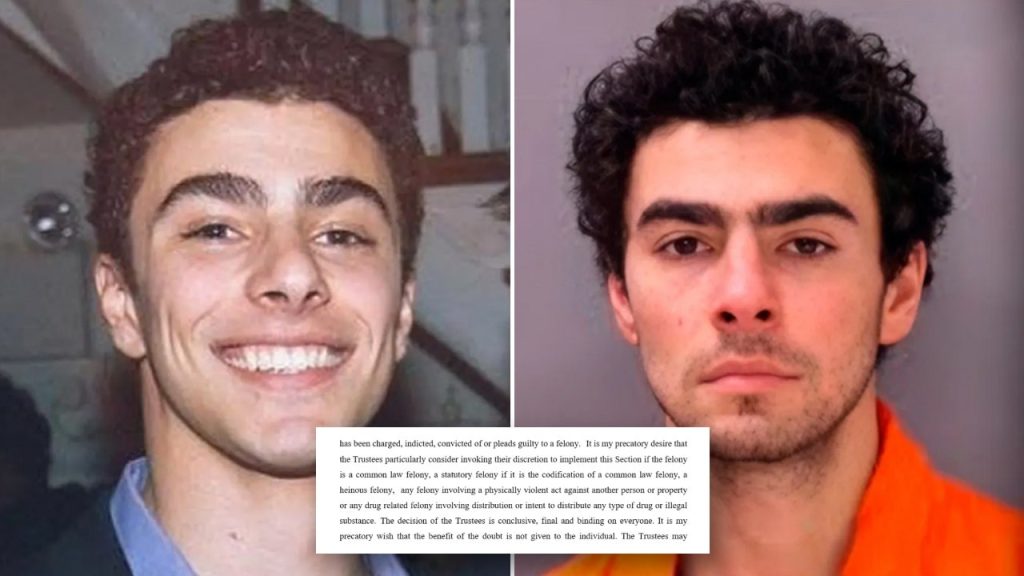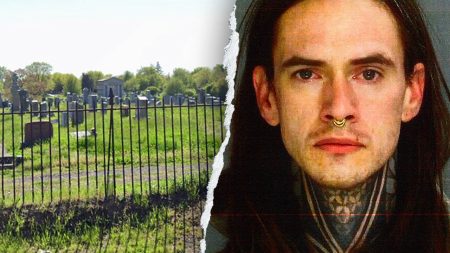Luigi Mangione, the 26-year-old suspect in the murder of UnitedHealthcare CEO Brian Thompson, faces a potential forfeiture of a substantial inheritance due to a clause in his grandmother’s will. Mary Mangione, a Baltimore-area philanthropist, stipulated that any descendant charged with, indicted for, convicted of, or pleading guilty to a felony would be disinherited. Luigi’s alleged crime, the murder of Thompson, undoubtedly falls under this provision, potentially jeopardizing his claim to a share of the estimated $30 million estate. The will explicitly encourages trustees to exercise their discretion in enforcing the clause, particularly in cases of violent felonies or drug-related offenses. The clause underscores Mary Mangione’s firm stance against criminal behavior within her family and reinforces the severity of Luigi’s alleged actions in the context of his family’s legacy.
The arrest of Luigi Mangione unfolded dramatically in an Altoona, Pennsylvania, McDonald’s. He presented a false identification to police and reportedly exhibited signs of anxiety when questioned about his recent whereabouts in New York City. His subsequent journey, traced through bus routes from New York to Philadelphia, Pittsburgh, and ultimately Altoona, paints a picture of a man on the run. The discovery of a handwritten manifesto condemning the health care industry, with specific mention of UnitedHealthcare, adds another layer to the investigation. This document, coupled with the suspect’s elaborate travel itinerary, suggests a premeditated act driven by a potent ideology against the healthcare system.
Luigi Mangione’s privileged background starkly contrasts with the apparent motive behind his alleged crime. A valedictorian of the prestigious Gilman School and a graduate of the University of Pennsylvania with dual degrees in computer science, Mangione hailed from a wealthy family. This stark juxtaposition has fueled public speculation about his potential motivations. The public discourse surrounding the case highlights the apparent disconnect between his privileged upbringing and the violent act he allegedly committed, raising questions about the potential influence of ideological convictions over socioeconomic status.
The killing of Brian Thompson sparked a wave of speculation and commentary, particularly regarding potential motives. While official pronouncements remain pending, public discourse points towards Mangione’s possible discontent with the healthcare industry and broader capitalist principles. This speculation has been further fueled by revelations of Mangione’s writings, including a Goodreads review of the Unabomber’s manifesto where he expressed a degree of understanding for the author’s anti-establishment sentiments. The incident has ignited a complex debate about healthcare, economic inequality, and the potential drivers of extreme actions.
The aftermath of the incident also brought into focus the reactions of various individuals and institutions. A University of Pennsylvania professor faced criticism for initially expressing sympathy for Mangione on social media, later retracting her statements and acknowledging their insensitivity. Furthermore, UnitedHealthcare confirmed that Mangione was not a beneficiary of their insurance plans, dispelling any speculation of a direct personal grievance related to coverage. These incidents underscore the multifaceted nature of the case and the diverse reactions it has elicited, highlighting the complexities of navigating public discourse in the wake of a high-profile crime.
Luigi Mangione currently faces a multitude of charges across two states. In New York, he is charged with murder, weapons possession, and possessing a forged document. In Pennsylvania, he faces charges related to forgery, carrying a firearm without a license, and providing false identification. The accumulation of these charges reflects the seriousness of the alleged crime and the legal challenges that lie ahead for Mangione. The case continues to unfold, with the potential disinheritance from his grandmother’s will adding another dimension to the legal and personal ramifications of his alleged actions.











